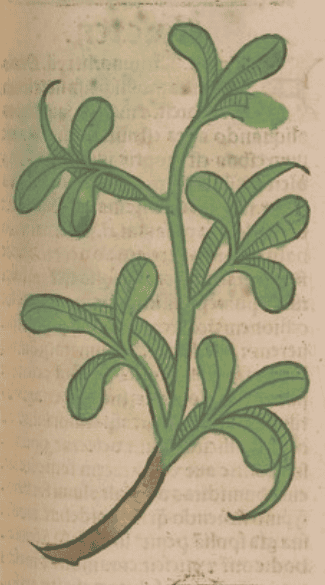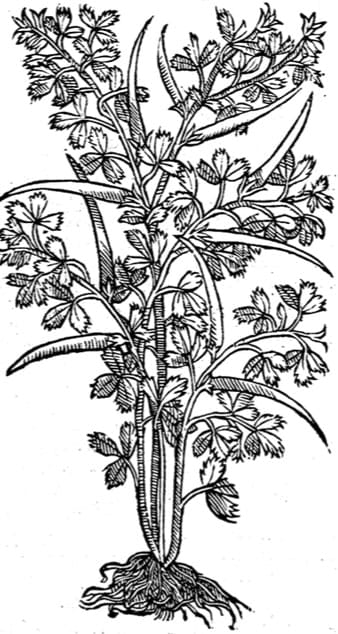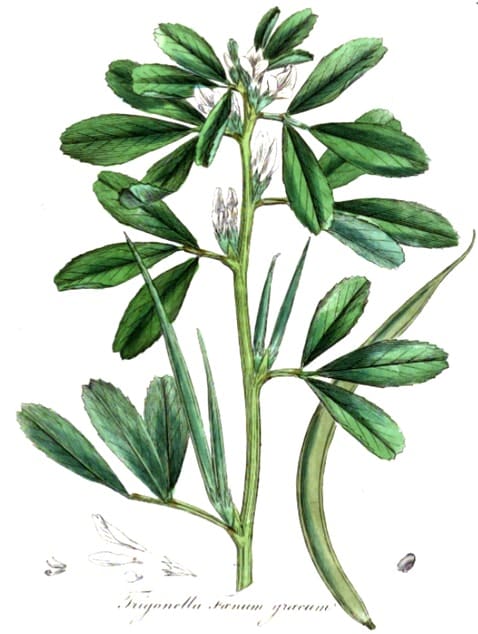Trigonella, Fenugreek, Hu Lu Ba 葫芦巴Foenum GraecumHu Lu Ba (TCM) Hulba (Unani) Methi (Ayurveda) Venthayam (Siddha) |

|

|
 Ortus Sanitatis, Meydenbach, 1491
Ortus Sanitatis, Meydenbach, 1491

|

|
|
Dioscorides Materia Medica, Mathias, 1563 |
Medical Botany, Woodville, Hooker, Vol. 3, 1832 |
Botanical name:
Trigonella foenum-graecum
Parts used:
Seed
Temperature & Taste:
Warm, dry. Bitter, Pungent
“Hot in the last phase of the First degree and Dry in the First degree”. (Avicenna)
Classifications:
2B ATTENUATER. 2G. CLEANSING. 2J. RAREFYING. 2L. EMOLLIENT. 2Q. ANODYNE. 2U. SUPPURATIVE. 2V. EXPEL PUS
2W. SARCOTIC
3L. ANTI-TUSSIVE
4d. PECTORAL. 4f. SPLENETIC. 4j. NERVINE
Laxative, Purgatives and Cathartics
Uses:
1. Warms and Strengthens the Kidneys: (TCM, West, Ayurveda, Tibetan)
-Cold and Weak Kidneys with Lower Back Pain
-Edema, Fluid Retention
-Aphrodisiac; Impotence, male Infertility, cold Testicular pain
-Lumbago, Arthritis, Rheumatism, Sciatica
-Diabetes
2. Strengthens the Lungs, clears Phlegm, stops Cough: (West, Ayurveda)
-Cold-Phlegm type Cough and Wheezing, either acute, or chronic with Deficiency
-acute sore Throat, Tonsillitis
-Cough, Bronchitis, Asthma, Emphysema, Tuberculosis
-Scrofula
-Pus in the Lungs (Tibetan Medicine)
-“Fenugreek clears Voice, nourishes the Lungs, softens the Chest and Throat, soothes the Cough and Asthma”. (Avicenna)
3. Strengthens the Spleen, Increases Qi: (West, Ayurveda, Tibetan)
-increases appetite and digestion
-increases strength and body weight
-convalescence, chronic illness, debility, anemia
4. Moistens the Intestines: (West, Ayurveda)
-gentle, soothing laxative
-inflammation of the Stomach or Bowels; Gastritis, Dysentery
-decoction can be given for Ulcers of the Intestines (Pliny)
-“decoction is also a good remedy for Dysentery and Diarrhea”. (Avicenna)
-“decoction of Fenugreek with honey expels the thick fluids from intestines”. (Avicenna)
5. Moves the Blood, Promotes Menstruation: (West)
-Amenorrhea and Dysmenorrhea associated with Cold
-used for hardness, swellings and tumors of the Uterus (mostly topically)
-traditionally to increase Breast size and give a more shapely body to women
-stimulates Labor (Pliny); “Fenugreek facilitates delivery”. (Avicenna)
-“Fenugreek dissolves Phlegmatic and Hard Swellings”. (Avicenna)
6. Promotes and Enriches Breast Milk: (West, Ayurveda)
-nourishes Breast Milk, increases quality and quantity
7. Externally:
-commonly used in Enemas and Douches
-douche, wash, sitz-bath or suppository is good for Abscesses, Ulcers, Hardness, Swellings, Inflammations and Obstructions of the Uterus and to soften all hard Tumors of it.
-“Used as a pessary with duck fat to cure hardness of Uterus”. (Avicenna)
-externally for Cold type skin eruptions, Wounds, Tumors, Abscesses, Boils, Swollen Glands, Scrofula, Sores
-“It softens and matures Abscesses” (Avicenna)
-topically for Pain and Inflammation in plasters and fomentations
-decoction as a wash for strong underarm odor (Pliny)
-decoction is used as a wash for Dandruff
-“used in Freckles, [and for] improvement of Complexion”. (Avicenna)
-“The oil of Fenugreek, obtained with Myrtle, is useful for the Hair and also for removing the Scars.” (Avicenna)
-“Its mucilage is usefuI in (skin) Ruptures attributed to Cold exposure, particularly when used with rose oil”. (Avicenna)
Dose:
1. Pliny noted that prolonged boiling reduces its bitterness.
2. “It makes the feces less foul smelling while the urine and perspiration become stinking”. (Avicenna)
Decoction: 4½–9 grams
Powder: 1–4 grams
Commonly used in Enemas and Douches.
Used topically in plasters, oils and as a mucilage.
Correctives:
1. Vinegar
2. Lemon juice;
3. Aniseed;
4. Seeds and leaves of Chicory, Spinach and Purslane. (Unani)
Substitutes:
1. Linseed
2. Alfalfa seed (Unani).
Main Combinations:
Fenugreek & Linseed
These two medicine form mucilage when combined with water. They therefore have a soothing, softening, emollient action. They are are often combined for use in Enemas, Douches, Baths and Sitz-baths, and in plasters and poultices.
Lungs:
1. Cold and Moist Cough, Fenugreek with Cinnamon, Hyssop, Licorice, Figs, Dates, Aniseed, Almonds (Wirtzung)
2. To clear Phlegm:
i. Fenugreek mucilage with Honey (Salmon)
ii. Fenugreek with Fennel seed and Plantain
3. Cough and Asthma from weakness:
i. Fenugreek with Honey and Figs and/or Dates. (Avicenna)
ii. Fenugreek with Raisins (equal parts) as a decoction.
iii. “It is better that the extract of Fenugreek and puIpy dates is put together and mixed with a large quantity of honey and then heated on the live coal moderately. This preparation is to be taken before meals for a long period”. (Avicenna)
4. Asthma, Difficulty Breathing, Fenugreek, Raisins (equal parts). Decoct and give often. ‘It gives relief immediately’ (Syrian ‘Book of Medicine‘, Budge, 1913)
5. Shortness of Breath, Fenugreek, Rhubarb, Madder, Myrrh, Saffron, Agrimony (asin Troches for Shortness of Breath)
(Syrian ‘Book of Medicine‘, Budge, 1913)
6. Lung Ulcers:
i. ‘A pottage too is made of this meal, which is taken for ulcerations of the chest and chronic coughs; it is kept boiling a considerable time, in order to remove the bitterness, after which honey is added’. (Pliny)
ii. Fenugreek with Comfrey root
iii. Fenugreek and Dates in Decoction
Poison:
7. Sore Throat, Tonsillitis, Fenugreek with Agrimony and Sage as a gargle
8. Scarlet Fever, Fenugreek with Yarrow, Calamus and Camomile
9. Leprosy, Fenugreek with one quarter part Nasturtium (Pliny)
Digestive System
10. Indigestion, loss of Appetite, Diarrhea, Fenugreek with Triphala (3 Myrobalans), Trikatu (3 Pungents), Cyperus rotundus, Cumin, Cinnamon, Cardamon, Rock Salt (equal parts), Fenugreek (equal to the rest). Mix with Ghee and Honey, Dose: 1–2 drams. (Ayurveda)
11. Indigestion, Bloating, Colic:
i. Fenugreek with Fennel, Cumin, Coriander seed
ii. Fenugreek, Ginger, Long Pepper, Cumin seed
12. Indigestion, Poor appetite, Fatigue from Spleen Qi deficiency:
i. Fenugreek, Withania, Triphala
ii. Fenugreek, Astragalus, Licorice
13. Cold-type Hernia:
i. Fenugreek with Fennel seed (TCM)
ii. Fenugreek with Comfrey root, Aniseed
Gynecology, Obstetrics:
14. Amenorrhea, Dysmenorrhea:
i. Fenugreek, Cyperus rotundus, Cinnamon
ii. Fenugreek with Shatavari (Asparagus racemosus), Saraca indica (Ayurveda)
15. To stimulate Labor, Fenugreek powder is taken with boiled must.
16. To increase Milk:
i. Fenugreek with Fennel, Aniseed
ii. Fenugreek with Fennel, Shatavari (Asparagus racemosus) (Ayurveda)
iii. Fenugreek, Hops, Blessed Thistle
17. Inflammation and pain of the Uterus or Bowels, boil Fenugreek with Mallow, then take with honied wine; ‘extolled’ (Pliny)
18. Polycystic Ovary Syndrome, Fenugreek with Aloe, Sphaeranthus, Indian Spikenard and Symplocos racemosa
19. Hardness of the Uterus:
i. decoct Fenugreek in wine. (Salmon)
ii. Fenugreek, Zedoary, Cyperus rotundus
Other:
20. Diabetes:
i. Fenugreek, Nigella, Chicory seed (proven efficacy)
ii. Fenugreek with Gymnema, Turmeric, Neem, Long Pepper, Ginger (Ayurveda)
21. Impotence, Fenugreek with Nutmeg, Withania, Sida cordifolia, Mucuna (Ayurveda)
22. Arthritic conditions, Fenugreek with Bdellium, Trikatu (Long and Black Pepper, Ginger), Boerhaavia
23. High Cholesterol, Fenugreek with Bdellium, Turmeric (Ayurveda)
Externally:
24. Hard Swellings, Tumors, Scrofula:
i. topically Fenugreek with Marshmallow, Linseed and Turpentine (as in Ointment of Marshmallow of Nicholas)
ii. topically Fenugreek with Saltpeter and Vinegar
25. Pessary for violent Uterine pain, Fenugreek boiled with barley or linseed in hydromel, is formed into a pessary. (Dioclesre out of Pliny)
26. Leprous sores, Freckles, equal parts of Fenugreek meal and Sulphur are used topically (Pliny)
27. Dandruff or Ringworm, Fenugreek meal with wine and niter, ‘speedily cures’ (Pliny)
28. Decocted in Hydromel with grease added, it was long applied to inflamed tumours, swellings of the parotid glands, arthritis in the feet and hands, joint diseases, and to cover bare bones in Wounds. (Pliny)
29. Sprains, knead the meal in vinegar and apply (Pliny)
30. ‘Kneaded with wine, it acts as a detergent upon carcinomatous sores; after which, applied with honey, it effects a perfect cure’. (Pliny)
31. Burns, topically with Rose oil. (Avicenna)
Major Formulas:
Decoction for Asthma (Zacharia)
Decoction for Asthma and Difficulty Breathing
Water for Cancer
Tragacanth Warming Powder (Pulvis Diatragacanth Calidii) (Nicholas)
A Sound and Experienced Electuary (Mesue)
Confection for Cold Cough
Troches for Pleurisy when not from Vehement Heat
Troches for Shortness of Breath
Ointment of Marshmallow (Nicolas)
Diachilon Plaster (Emplastrum Diachilon)
Cautions:
1. Not used (alone) for Heat or Fever, especially Deficient Heat
2. Not used during Pregnancy
Toxicity:
A systematic literature review of fenugreek seed toxicity by using ToxRTool: evidence from preclinical and clinical studies
Main Preparations used:
Mucilage, Mucilaginous Oil
1. Mucilage of Fenugreek:
i. Fenugreek seed (1 part), Water (10 parts). Macerate 12 hours; boil, express. (Pharmacopoeia Sardoa, 1773)
2. Mucilaginous Oil:
i. Fenugreek seed bruised (8 oz.), Linseed oil (2 lbs.). Infuse 10 days, strain.
Pliny on Fenugreek:
|
‘Nor is fenugreek held in less esteem. By some it is known as “telis,” by others as “carphos,” and by others again as “buceras,” or “segoceras,” the produce of it bearing some resemblance to horns. Among us it is known as “silicia.” The mode of sowing it we have already described on the appropriate occasion. Its properties are desiccative, emollient, and resolvent. A decoction of it is useful for many female maladies, indurations for instance, tumours, and contractions of the uterus; in all which cases it is employed as a fomentation or used for a sitting-bath: it is serviceable also as an injection. It removes cutaneous eruptions on the face; and a decoction of it, applied topically with nitre or vinegar, cures diseases of the spleen or liver. In cases of difficult labour, Dioclesre commends the seed pounded, in doses of one acetabulum, mixed with boiled must. After taking one third of the mixture, the patient must use a warm bath, and then, while in a perspiration, she must take another third, and, immediately after leaving the bath, the remainder— this, he says, will prove a most effectual means of obtaining relief. ‘The same authority recommends fenugreek boiled, with barley or linseed, in hydromel, as a pessary for violent pains in the uterus: he prescribes it also as an external application for the lower regions of the abdomen. He speaks also of treating leprous sores and freckles with a mixture composed of equal proportions of sulphur and meal of fenugreek, recommending it to be applied repeatedly in the course of the day, due care being taken not to rub the part affected. |
‘For the cure of leprosy, Theodoras prescribes a mixture of fenugreek, and one fourth part of cleaned nasturtium, the whole to be steeped in the strongest vinegar. Damion used to give a potion by way of emmenagogue, consisting of half an acetabulum of fenugreek seed in nine cyathi of boiled must and water. There is no doubt too, that a decoction of it is remarkably useful for diseases of the uterus and for ulcerations of the intestines, and that the seed is beneficial for affections of the joints and chest. Boiled with mallows and then taken in honied wine, fenugreek is extolled in the highest terms, as serviceable for affections of the uterus and intestines. Indeed, the very steam that arises from the decoction may be productive of considerable benefit. A decoction too of fenugreek seed is a corrective of the rank odours of the armpits. Meal of fenugreek, with wine and nitre, speedily removes ring-worm and dandruff of the head; and a decoction of it in hydromel, with the addition of axle-grease, is used for the cure of diseases of the generative organs, inflamed tumours, imposthumes of the parotid glands, gout in the feet and hands, maladies of the joints, and denudations of the bones. Kneaded with vinegar, it effects the cure of sprains, and, boiled in oxymel only, it is used as a liniment for affections of the spleen. Kneaded with wine, it acts as a detergent upon carcinomatous sores; after which, applied with honey, it effects a perfect cure. A pottage too is made of this meal, which is taken for ulcerations of the chest and chronic coughs; it is kept boiling a considerable time, in order to remove the bitterness, after which honey is added. (The Natural History of Pliny, trans. by Bostock and Riley, Vol. 5, 1856) |
Pharmacographia, Fluckiger & Hanbury, 1879
|
‘In the old Egyptian preparation Kyphi, an ingredient “Sebes or Sebtu ” is mentioned, which is thought by Ebers to mean fenugreek. This plant was well known to the Roman writers on husbandry, as Porcius Cato (B.C. 234-149) who calls it Foenum Graecum and directs it to be sown as fodder for oxen. It is the [?] of Dioscorides and other Greek writers. Its mucilaginous seeds, “siliquae” of the Roman peasants, were valued as an aliment and condiment for man,and as such |
are still largely consumed in the East. They were likewise supposed to possess many medicinal virtues, and had a place in the pharmacopoeias of the last century. The cultivation of fenugreek in Central Europe was encouraged by Charlemagne (A.D. 812), and the plant was grown in English gardens in the 16th century.’ |
Vegetable Materia Medica of Western India, Dymock, 1885
|
‘Fenugreek has a history of great antiquity; it was much valued by the ancients both as a food and medicine; in India it has long been extensively cultivated, its seeds being considered carminative, tonic, and aphrodisiac. Several confections made with them are described in Sanskrit works under the names of Methi modaka, Svalpa methi modaka, &c, and are recommended for use in dyspepsia with loss of appetite, in the diarrhoea of puerperal women, and in rheumatism. All these preparations consist of a number of aromatic substances, one part each, and fenugreek seeds equal in quantity to all the other ingredients. Under the Arabic name of Hulbah, Mahometan writers describe the plant and seeds as hot and dry, suppurative, aperient, diuretic, emmenagogue, useful in dropsy, chronic cough and enlargements of the spleen and liver. A poultice of the leaves is said to be of use in external and internal swellings and burns, and to prevent tho hair falling off. The flour of the seeds is used as a poultice, and is applied to the skin as a cosmetic. They also use the oil of the seeds for various purposes. |
In Europe the history of the plant is equally ancient. Aretaeus prescribed it both internally and externally. The powder of the seeds was recommended by Dioscorides in the form of a poultice for inflammatory affections. Pliny mentions its various uses as a medicine. Ainslie notices its uses by native practitioners in Southern India for dysentery, the seeds being toasted and afterwards infused. At the present time, Fenugreek is extensively used in India both as an article of diet and as a medicine. The young plants are always to be found in the vegetable markets, and are most esteemed when only the two seed leaves are formed; they are boiled and afterwards fried in butter, the taste is strongly bitter, and disagreeable to those who have not become accustomed to it; in bilious states of the system the vegetable has an aperient action. The seeds form the basis of a medicinal confection extensively used by the natives. They also enter into the composition of an imitation of carmine. The yellow decoction used with sulphate of copper produces a fine permanent green. In the Concan the leaves are used both internally and externally on account of their cooling properties’. |
